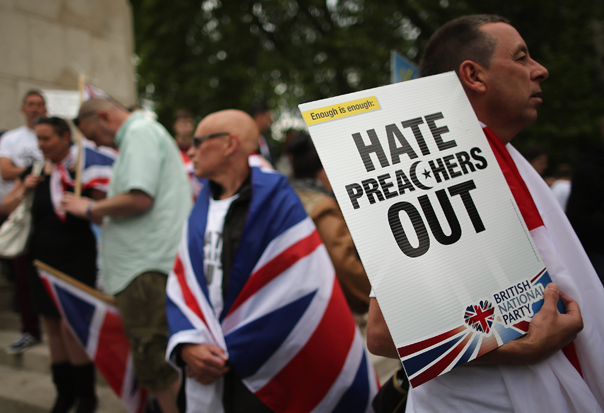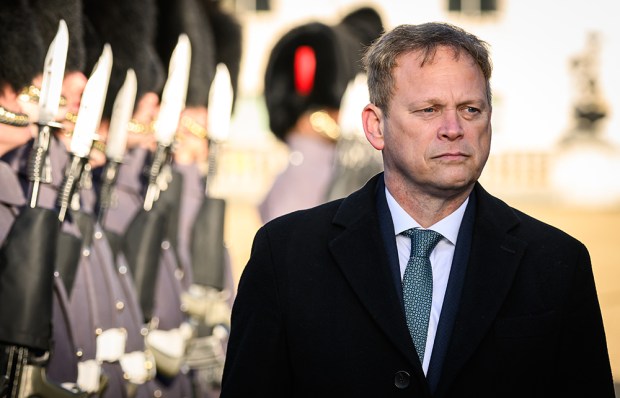British public opinion has never really turned against Muslims. According to Pew’s 2014 Global Attitudes survey, 26 per cent of us have ‘unfavourable’ attitudes towards Muslims in this country; compare that to 46 per cent in Spain, 53 per cent in Greece and 63 per cent in Italy.
Our national tolerance has, so far, proved robust. Even after the 7/7 London bombings, favourable attitudes towards Muslims in Britain dipped by only a couple of points. But is it strong enough to survive the horrors of Isis and Rotherham coming to light simultaneously?
It feels as if we are on the verge of an anti-Muslim backlash that could spread beyond the strongholds of the aggrieved white working class in Barking and Rochdale and into the home counties.
Last weekend a group of British imams issued a fatwa forbidding Muslims from volunteering for Isis. Their ruling — which is unlikely to have the slightest effect on young militants — may reflect spontaneous disgust at the actions of the so-called Islamic State. But there is an additional flavour of panic.
In the past, Muslim community leaders have condemned Islamist terrorism in language clouded by the rhetoric of minority grievance. Anyone who presses them on the topic has been drowned out by the ululations of Yasmin Alibhai-Brown. This anti-Isis fatwa is different. It says that Muslims giving humanitarian aid to Syrians or Iraqis must do so ‘without betraying their own societies’.
The change of tone speaks volumes. The 2005 bombings and the murder of Lee Rigby last year could not plausibly be blamed on whole communities. In contrast, the departure of hundreds of young Muslims to fight for Isis raises questions about community loyalty. The imams have accused the jihadis of ‘betraying’ Britain because they don’t want the accusation flung back at them.
The Guardian reported last week that British extremists were among ‘the most vicious and vociferous fighters’ in the ranks of Isis. But this we knew. For UK Muslims, the fact that James Foley’s executioner spoke with a London accent was a public relations disaster. It wasn’t great for Britain, either, which is now routinely accused by Americans of harbouring an enemy within.
Then came Rotherham. It’s no secret that Asian grooming gangs have been targeting white girls on sink estates — but until last month social workers and the police conspired to keep the full truth from us. They protected Pakistani elders who turned a blind eye to organised rape. Why?
The press blame ‘political correctness’, but there is a more specific explanation. The authorities were terrified that grooming would be seized upon by racists playing the Muslim card. Their fears weren’t unfounded. In 2004 the British National Party won a council seat in Keighley West with 51 per cent of the vote by exploiting local outrage over a grooming scandal. Its tactics were crafty. In BNP leaflets, the adjective ‘Pakistani’ was replaced by ‘Muslim’. Nick Griffin praised Sikh and Hindu activists who had tried to draw attention to the ‘Muslim sex gangs’.
The BNP has since imploded, but not before popularising the idea that the sexual appetites of Pakistani thugs were fuelled by Islam. American conservatives picked over the Koran looking for parallels between the violence of gang rape and the violence of jihad. Islamic scholars dismissed this as a violation of their scriptures. Inconveniently for them, however, ‘Muslim’ street gangs in Europe and America started playing the same game, arguing that the Koran permitted any assault against the kuffar (non-believers).
Now British public opinion has woken up, thanks to an explosion of headlines about crucifixions in Iraq and unspeakable assaults on girls in Yorkshire. Some of those headlines are a good thing, in so far as they mark the failure of the liberal establishment to distract our attention towards more fashionable subjects (Gaza). Other headlines are a disgrace. Right-wing websites juxtapose footage of Iraqi massacres with gloating articles about ‘Muslim gang rapists’. Tweets about Rotherham carry the hashtag #Islam. The remnants of the BNP must be proud.
Will Islam-haters succeed in provoking a backlash that makes life difficult for law-abiding Muslims? History suggests not. The British people rarely persecute minority religions: the last big disturbance, the anti-Catholic Gordon Riots of 1780, was confined to London. But history isn’t a reliable guide.
The religious landscape of Britain has changed more in the past 30 years than in the preceding 300. Most young people are agnostic or atheist. Secularism has spawned an aggressive ideology. Its apostle, the embarrassing Richard Dawkins, has taken to attacking Muslims with the ferocity of an inquisitor. From his point of view that makes sense: Islam is Britain’s fastest-growing religion, having doubled its numbers to around three million since 2000. One in ten children under the age of four is a Muslim.
The big question is how mainstream British Islam will react. A wise approach would be to treat the sneering left and the Muslim-baiting right with equal contempt. But it should also re-examine its relationship with ordinary Britons, who are traditionally tolerant of minority faiths.
Pew research in 2006 found that British Muslims were more hostile to western values than their German, French or Spanish counterparts. In the four countries, the ‘mismatch’ between friendly attitudes towards Muslims and unfriendly attitudes towards the host society was greatest in the UK. That should make us uneasy.
In the years since the Pew survey, we have experienced chaotic immigration and been shocked to the core by the savagery of Islamists. We’re not used to this. So far, most Muslims have weathered the storm by keeping their heads down and their eyes averted from western decadence. That strategy won’t work for much longer. The lumping together of Rotherham and Isis may be malicious and misleading, and no one expects British Muslims to buy the argument that these atrocities are sanctified by the Koran. But they do need to bypass their useless community leaders and find better means of expressing their horror — individually and collectively — at crimes against humanity. In fact, in the current atmosphere, they have little choice: if they miss this opportunity, ordinary Britons will start listening to the hate-mongers.
Got something to add? Join the discussion and comment below.
Get 10 issues for just $10
Subscribe to The Spectator Australia today for the next 10 magazine issues, plus full online access, for just $10.
You might disagree with half of it, but you’ll enjoy reading all of it. Try your first month for free, then just $2 a week for the remainder of your first year.














Comments
Don't miss out
Join the conversation with other Spectator Australia readers. Subscribe to leave a comment.
SUBSCRIBEAlready a subscriber? Log in